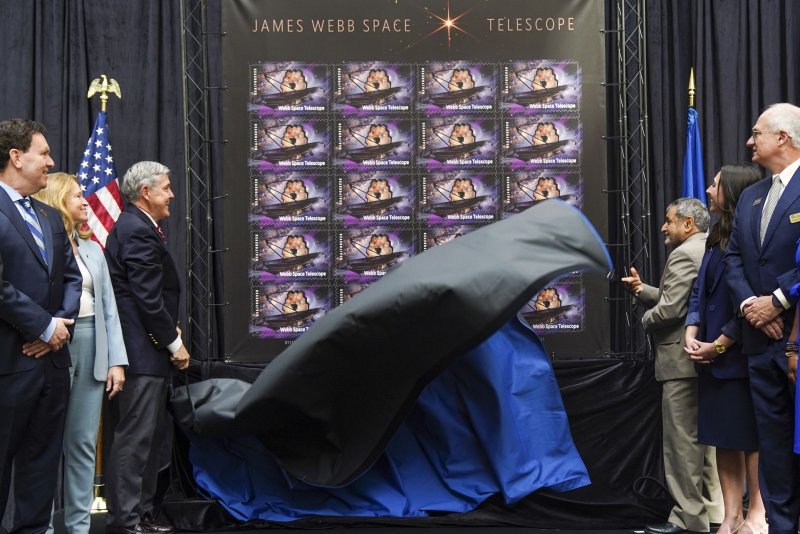
Officials unveil the James Webb Space Telescope stamp at the
Smithsonian National Postal Museum in Washington on Thursday.
"The James Webb Space Telescope orbits the sun about a million miles away from our planet. Now it will travel the United States mail system, with the launch of this new Forever stamp," Anton Hajjar, U.S. Postal Service Board of Governors vice chairman, said in a statement.
"The Webb telescope is sending truly astounding images, I'm sure you will agree! The telescope itself, which we celebrate in this stamp, is an engineering marvel, decades in the making."
The $10 billion telescope is composed of 18 hexagonal mirrors that are 21 feet across. The JWST sent its first dazzling images back to Earth in July.

This image, which was one of the first to be sent back to Earth from the James Webb Space Telescope on July 12, shows the edge of a young, star-forming region, NGC 3324 in the Carina Nebula
.jpg)
NASA Associate Administrator Bob Cabana said in a statement Thursday that he'd like the new stamps to elicit the same excitement that the JWST does.
"When anyone who uses these stamps looks at this telescope, I want them to see what I see: its incredible potential to reveal new and unexpected discoveries that help us understand the origins of the universe, and our place in it," Cabana said.
Photo by Leigh Vogel/UPI | License Photo
Sept. 8 (UPI) -- A new postage stamp celebrating NASA's new James Webb Space Telescope, which is the most powerful scope ever put in space, was released on Thursday.
The U.S. Postal Service and NASA celebrated the new stamp at the Smithsonian's National Postal Museum in Washington.

The image on the stamp is an artist's depiction of the groundbreaking telescope -- and the words "Webb Space Telescope" appear in white along its bottom edge. It's a "forever" stamp, meaning it will be good to send postage at any time in the future.
The release on Thursday came nine months after the telescope was launched into space.
Sept. 8 (UPI) -- A new postage stamp celebrating NASA's new James Webb Space Telescope, which is the most powerful scope ever put in space, was released on Thursday.
The U.S. Postal Service and NASA celebrated the new stamp at the Smithsonian's National Postal Museum in Washington.

The image on the stamp is an artist's depiction of the groundbreaking telescope -- and the words "Webb Space Telescope" appear in white along its bottom edge. It's a "forever" stamp, meaning it will be good to send postage at any time in the future.
The release on Thursday came nine months after the telescope was launched into space.
"The James Webb Space Telescope orbits the sun about a million miles away from our planet. Now it will travel the United States mail system, with the launch of this new Forever stamp," Anton Hajjar, U.S. Postal Service Board of Governors vice chairman, said in a statement.
"The Webb telescope is sending truly astounding images, I'm sure you will agree! The telescope itself, which we celebrate in this stamp, is an engineering marvel, decades in the making."
The $10 billion telescope is composed of 18 hexagonal mirrors that are 21 feet across. The JWST sent its first dazzling images back to Earth in July.

This image, which was one of the first to be sent back to Earth from the James Webb Space Telescope on July 12, shows the edge of a young, star-forming region, NGC 3324 in the Carina Nebula
. Photo by NASA/UPI
The telescope's infrared vision can peer 13.5 billion years into the universe's past -- seeing the light of the first stars and galaxies as they formed after the Big Bang. Unlike the Hubble Telescope, which orbits the Earth, Webb is floating at a certain location in space known as a Lagrange point, nearly 1 million miles away from Earth.
The telescope, which was first conceived in the 1990s as a successor to Hubble, is a joint venture by NASA, the Canadian Space Agency and European Space Agency. Northrop Grumman started building the giant piece of equipment in California in 2004.
The telescope's infrared vision can peer 13.5 billion years into the universe's past -- seeing the light of the first stars and galaxies as they formed after the Big Bang. Unlike the Hubble Telescope, which orbits the Earth, Webb is floating at a certain location in space known as a Lagrange point, nearly 1 million miles away from Earth.
The telescope, which was first conceived in the 1990s as a successor to Hubble, is a joint venture by NASA, the Canadian Space Agency and European Space Agency. Northrop Grumman started building the giant piece of equipment in California in 2004.
.jpg)
NASA Associate Administrator Bob Cabana said in a statement Thursday that he'd like the new stamps to elicit the same excitement that the JWST does.
"When anyone who uses these stamps looks at this telescope, I want them to see what I see: its incredible potential to reveal new and unexpected discoveries that help us understand the origins of the universe, and our place in it," Cabana said.
.jpg)
No comments:
Post a Comment